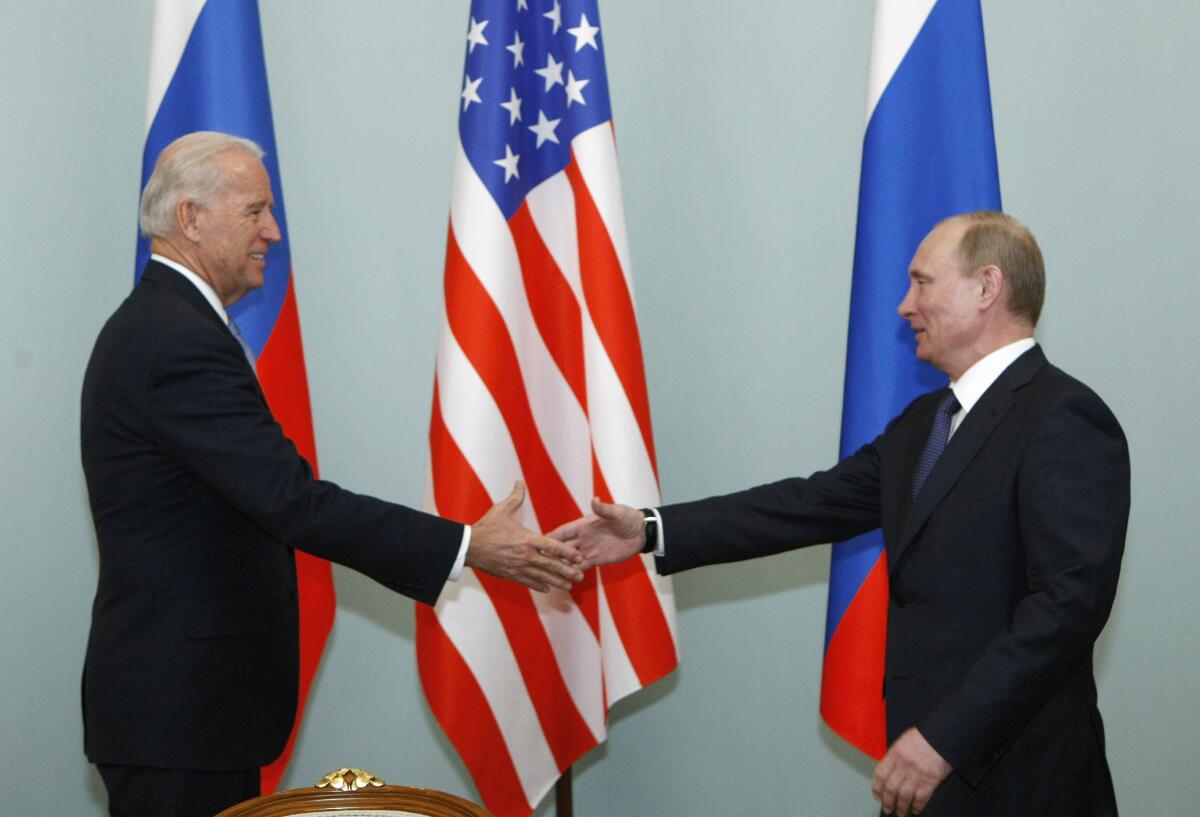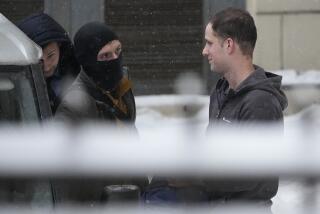Opinion: New U.S.-Russia sanctions punish the wrong people

While President Biden and his Russian counterpart Vladimir Putin are trying to decide where to meet — in Vienna, Reykjavik or Helsinki? — Americans and Russians are trying to figure out whether the sanctions imposed by the two countries make it impossible for them to visit Moscow or Washington.
The U.S. Embassy in Moscow announced that as of Wednesday it would stop issuing non-immigrant visas to Russians there. Russians who want to travel to the U.S., or study or conduct business activities here, will be able to apply for visas only in third countries.
The suspension of consular services is a result of the latest sanctions exchange between Washington and Moscow. In April, Biden imposed restrictions on more than 30 Russians and Russian tech companies accused of interfering in the 2020 presidential elections. Also, the president expelled 10 Russian diplomats, some of whom the White House said were working for the Russian intelligence services.
In response, the Kremlin blacklisted eight current and former U.S. officials and, in a tit-for-tat move, expelled 10 U.S. diplomats. Moscow, however, went further in restricting representatives of the U.S. mission. The Kremlin prohibited the U.S. Embassy from employing Russians in any capacity, which has become a heavy blow for the American mission in Russia, as it had many local hires. “We regret that the actions of the Russian government have forced us to reduce our consular workforce by 75%,” the embassy said in a statement.
Actually, it has been tough to get an American visa in Moscow since 2017, after Putin, responding to American sanctions, ordered the U.S. to cut over 750 diplomatic employees in Russia. He achieved his goal of equalizing the number of diplomats in both countries (a maximum of 455).
But for Russians planning to visit the United States, the personnel cuts translated into months of waiting for a visa interview. Most of them preferred to go to neighboring countries, such as Georgia or Belarus, where it was faster to get an American visa. Tourists with expired visas also had been able to renew them in Russia without scheduling an appointment. That will not be possible anymore.
One of my friends in Moscow is now figuring out her options for coming to the U.S. According to her, embassies of the U.S. in many other countries are accepting applications only from their citizens. Among the few countries that are issuing American visas to Russians is Kazakhstan; getting there and back from Moscow requires at least a three-hour flight costing $500 to $1,000. To go through all these difficulties, you‘d need to be a real fan of the U.S. Otherwise, a Russian would opt for a vacation in a country with easier visa regulations.
Another friend of mine, an American, is trying to find a way to visit Russia. In April, the Russian foreign ministry boasted that, despite the closure of several diplomatic facilities in the U.S., Russian consulates were still issuing visas for Americans within 10 days. Actually, as I learned, American citizens haven’t been able to get Russian tourist visas since March 2020 due to the COVID-19 pandemic. However, representatives of the Russian Embassy promise that they will resume their services when the pandemic subsides. They insist that the expulsion of diplomats won’t affect the visa issuance for Americans.
The Russian foreign ministry pointed out that, after the staff cutback, the U.S. mission in Russia had only 280 American employees, though it can have up to 455. It made clear that nothing was stopping the U.S. Embassy from hiring 175 American citizens and bringing them to Russia to process visas. Russian officials accused the U.S. mission in Russia of ineffective work. “They should have said: ‘We do not know how to work and do not want to,’” the ministry concluded in a Facebook post.
U.S. State Department spokesperson Ned Price said on April 29 that the ban on hiring Russian citizens “would have a negative impact on our mission’s ability to operate and ... our ability to engage diplomatically with our Russian counterparts.” He added, “And we, of course, do reserve the right to respond.” But the State Department offered no explanation for why it wouldn’t hire more American citizens for those jobs. A department spokesperson insisted that it was the Russian government that had “chosen to further limit diplomatic interaction between the two countries.”
Given that the Russian mission in the U.S. doesn’t employ American citizens, the hiring ban doesn’t seem draconian. Russian officials, however, evidently knew how painful it would be for their American counterparts. Lecturer at Rutgers University Sergei Kostiaev thinks that the Russian regime is getting more dictatorial, and it sees all kinds of cultural exchanges as a threat.
However, the question as to why the State Department wouldn’t staff its embassy in Russia with more Americans remains unanswered. So, even Putin’s opponents now accuse Washington of escalation. Journalist and activist Ksenia Sobchak, who ran against Putin in the 2018 presidential elections, blamed the U.S. for creating conditions similar to the Iron Curtain during the Cold War. “You can punish officials, but what have students and ordinary tourists done to the U.S.?” wrote Sobchak.
The tourist flow between the USA and Russia is significant. In 2019, before the pandemic, 240,000 Americans visited Russia, and 180,000 Russians obtained non-immigrant U.S. visas.
Recent years have seen no improvements in terms of visas. After Biden called Putin a killer and Russia recalled its U.S. ambassador, there is no reason to hope that the coming meeting between the two leaders can solve this issue. It looks like Moscow and Washington are so busy with punishing each other that the problems of tourists don’t seem like a big deal to them. However, the U.S. probably unconsciously did a favor for the Kremlin, which is trying to keep Russians away from Western values. Moreover, now even apolitical Russian citizens will see the U.S. as an enemy when they learn about the new visa rules.
So, is it so necessary to sanction just regular folks? Wouldn’t it be more reasonable to separate geopolitics from cultural exchange and ensure that, despite restrictions, citizens of both countries can still interact with one another and learn about one another’s cultures?
More to Read
A cure for the common opinion
Get thought-provoking perspectives with our weekly newsletter.
You may occasionally receive promotional content from the Los Angeles Times.






